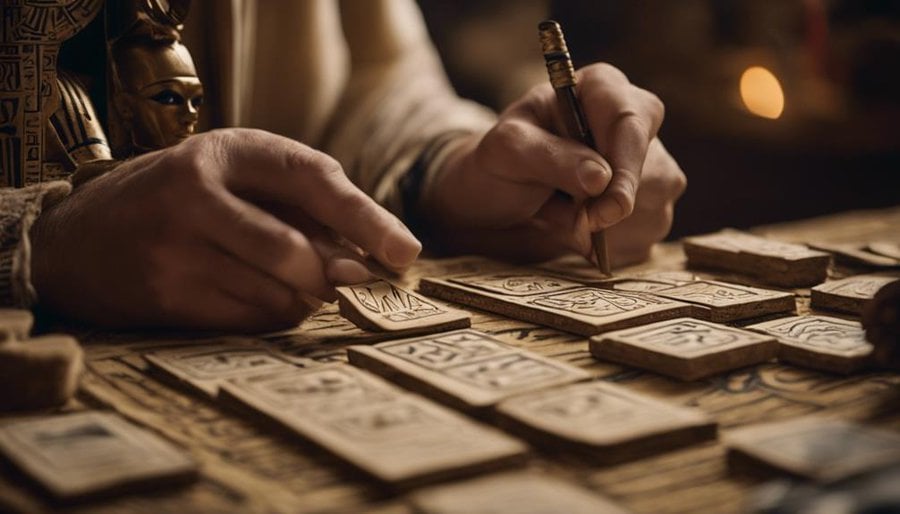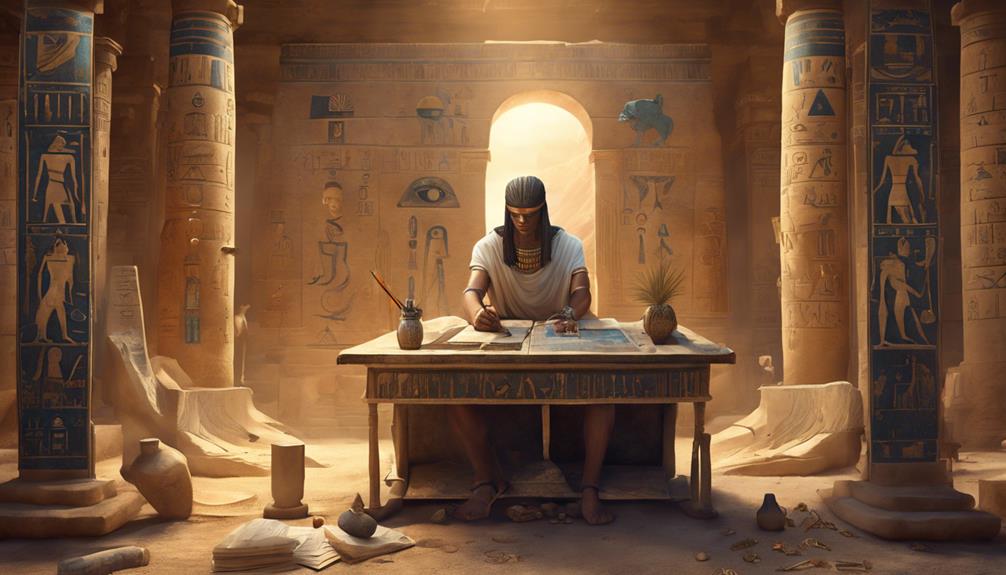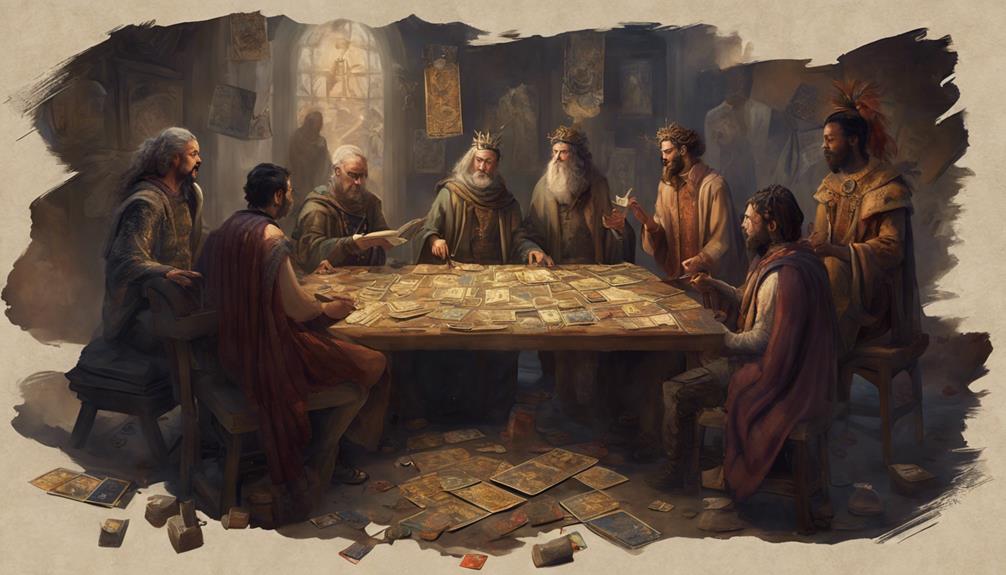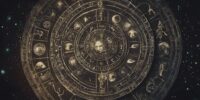How Antoine Court De Gébelin Unveiled Tarot's Alleged Egyptian Origins

However, historical evidence does not support this claim, as the Tarot likely originated in Europe during the late 14th century.
The Tarot deck consists of 78 cards, divided into two main sections: the Major Arcana and the Minor Arcana.
Each card carries symbolic imagery and can be interpreted in various ways, making Tarot a popular tool for divination and self-reflection.
Antoine Court De Gébelin: Background and Influences
Antoine Court De Gébelin's scholarly pursuits and eclectic interests shaped his profound contributions to the study and interpretation of tarot's alleged Egyptian origins. His exploration into the mystical domain of tarot wasn't merely a passing interest but a dedicated endeavor fueled by a deep curiosity for the occult and esoteric knowledge. De Gébelin's influential theories on the origins of tarot, particularly his belief in its Egyptian roots, sparked a new wave of interest and inquiry into the ancient practice.
Drawing upon his background in academia and his passion for uncovering hidden truths, De Gébelin plunged into the occult connections of the tarot, seeking to unravel its enigmatic symbolism and purported mystical properties. Through his writings and research, he brought to light the intricate relationship between tarot and ancient Egyptian mysticism, laying the foundation for future scholars and enthusiasts to explore the rich tapestry of meanings woven into the cards. De Gébelin's legacy endures as a beacon of enlightenment for those who seek to understand the profound mysteries embedded within the tarot deck.
The Tarot Deck: Origins and Evolution
How did the ancient Tarot deck come to be, and what pivotal moments shaped its evolution over the centuries?
The Tarot deck, with its intricate tapestry of evolutionary symbolism and profound cultural significance, traces its origins back to the 15th century in Europe. Initially used for card games, the Tarot gradually evolved into a tool of divination and self-reflection, mesmerizing the minds of mystics, scholars, and enthusiasts alike.
Through the centuries, the Tarot deck has undergone a remarkable transformation, adapting to different cultural contexts and acquiring layers of meaning along the way. Its journey has been one of continuous evolution, mirroring the shifting paradigms of society and the human psyche. Each card in the Tarot deck carries a rich tapestry of symbolism, reflecting archetypal themes and universal truths that resonate with seekers of wisdom and truth.
The Tarot's enduring appeal lies in its ability to transcend time and space, offering a mirror to the soul and a gateway to the mysteries of the universe. Its cultural significance and symbolic depth continue to inspire and intrigue, inviting us to explore further into the unknown.
De Gébelin's Egyptian Connection Theory

In the domain of Tarot's historical exploration, a theory proposed by De Gébelin regarding an alleged Egyptian connection stands as a point of significant intrigue and debate among scholars and enthusiasts alike. De Gébelin's belief in an Egyptian influence on the Tarot deck stems from his assertion that the cards' origins can be traced back to the ancient Egyptian Book of Thoth, a legendary tome believed to contain immense wisdom and mystical knowledge. This theory suggests that the symbols and imagery found in the Tarot cards were a reflection of the mystical teachings of ancient Egypt, making them a repository of esoteric wisdom and spiritual insight.
To shed light on De Gébelin's Egyptian Connection Theory, let's explore some key points in the following table:
| Key Points | Description |
|---|---|
| Origins | Traced back to ancient Egypt |
| Symbolism | Reflects mystical teachings |
| Influence | Alleged Egyptian connection |
| Wisdom | Repository of esoteric knowledge |
| Interpretation | Source of spiritual insight |
This theory has sparked debates and discussions, adding layers of mystery and allure to the fascinating tapestry of Tarot history.
Symbolism in the Tarot Cards
The rich tapestry of symbolism woven into each tarot card invites contemplation and interpretation. These symbols hold layers of meaning that transcend time and culture, sparking curiosity and reflection.
Exploring the origins and evolution of these iconic symbols sheds light on the profound depth of the tarot's imagery.
Tarot Card Meanings
Exploring the intricate layers of symbolism embedded within the Tarot cards reveals a rich tapestry of meaning waiting to be unraveled.
- Symbolic Interpretations: Each card in the Tarot deck carries a unique symbolism that speaks to the subconscious mind, offering insights and guidance.
- Spiritual Connections: The Tarot cards are often seen as a tool for spiritual growth and self-reflection, connecting individuals to universal truths and higher wisdom.
- Historical Significance: The origins of Tarot date back centuries, with each card reflecting historical events and societal norms of its time.
- Cultural Influences: Different cultures have influenced the Tarot's development, leading to diverse interpretations and variations across regions.
Delving into the meanings behind the Tarot cards can provide a profound understanding of oneself and the world at large.
Iconic Symbols Analysis
Delving into the intricate layers of symbolism woven within the Tarot cards reveals a profound tapestry of meaning waiting to be deciphered.
The presence of Egyptian influences in the Tarot deck adds a mystical aura to the symbols depicted on each card. Symbolism analysis in Tarot uncovers a rich amalgamation of cultural references, archetypal imagery, and esoteric wisdom.
The Major Arcana cards, such as The High Priestess or The Hierophant, are laden with potent symbols that connect to ancient Egyptian mysticism, emphasizing themes of intuition, spirituality, and divine knowledge.
The Minor Arcana cards also carry subtle hints of Egyptian symbolism, subtly weaving in elements like the Ankh or the Eye of Horus to enhance the depth of interpretation for those attuned to the secrets of the Tarot.
Historical Symbolism Origins
Unraveling the historical origins of symbolism within the Tarot cards reveals a mesmerizing journey through the corridors of ancient wisdom and mysticism. The historical significance of the Tarot's symbolism is deeply intertwined with various cultures and belief systems, offering a rich tapestry of meanings and interpretations.
Key points bear in mind include:
- Egyptian Influence: The Tarot's symbolism is often linked to ancient Egyptian mythology and iconography, suggesting a possible origin or influence from this ancient civilization.
- Mystery Schools: The symbols in the Tarot are thought to reflect teachings from mystery schools and esoteric traditions, adding layers of hidden knowledge for each card.
- Alchemy and Astrology: Many symbols in the Tarot cards draw upon alchemical and astrological principles, enriching the depth of their meanings.
- Hermetic Traditions: The Tarot's symbolism is also connected to Hermetic traditions, emphasizing the interconnectedness of the spiritual and material worlds.
Impact of De Gébelin's Research
De Gébelin's research sparked a profound shift in how tarot was perceived and studied by bringing forth the notion of its ancient Egyptian origins. This revelation not only impacted the way tarot was viewed but also influenced its cultural significance. De Gébelin's assertions added a layer of mystery and allure to the tarot cards, connecting them to a civilization known for its mysticism and wisdom.
In the historical context of the time, De Gébelin's claims were met with mixed academic reception. Some scholars were intrigued by the idea of tarot having roots in ancient Egypt, while others dismissed it as fanciful thinking. Nevertheless, the introduction of this theory opened up new avenues of exploration and interpretation for tarot enthusiasts and researchers alike.
The impact of De Gébelin's research extended far beyond his time, leaving a lasting impression on how tarot is understood and studied today. The idea of Egyptian origins continues to spark debates and fuel the imagination of those who seek to unravel the mysteries of the tarot.
Continued Controversy and Debate

In the domain of tarot studies, the persistence of controversy and ongoing debate surrounding its alleged Egyptian origins remains a proof to the enduring intrigue and complexity of this mystical practice. Despite centuries of scrutiny, the origins of tarot continue to spark heated discussions and impassioned arguments among scholars and enthusiasts alike.
- Historical Discrepancies: Discrepancies in historical records and a lack of concrete evidence have fueled the ongoing debate regarding the true origins of tarot.
- Symbolic Intricacies: The intricate symbolism present in tarot cards adds a layer of complexity to the debate, with interpretations varying widely among different schools of thought.
- Cultural Influences: The influence of various cultures on the development of tarot further complicates discussions, raising questions about whether its alleged Egyptian origins are plausible or merely speculative.
- Modern Perspectives: Modern scholars continue to bring new perspectives to the table, challenging traditional beliefs and contributing to the ongoing debate over tarot's ancient roots.
Modern Interpretations and Practices
Modern interpretations and practices of Tarot have evolved substantially over time.
Tarot in therapy has gained popularity, offering a unique approach to introspection and healing.
Additionally, the diverse range of decks available today allows for personalization and connection to individual beliefs and preferences.
Tarot in Therapy
Exploring the therapeutic applications of Tarot reveals a profound intersection between ancient symbolism and modern psychology.
Tarot symbolism can serve as a mirror, reflecting one's subconscious thoughts and emotions.
The therapeutic benefits of Tarot include providing a visual and tangible representation of complex feelings and situations.
Through Tarot readings, individuals can gain insights into their innermost desires and fears, fostering self-awareness and personal growth.
Tarot in therapy offers a non-conventional approach to self-reflection, encouraging individuals to explore their psyche in a creative and intuitive manner.
Diversity in Decks
Through the lens of diverse interpretations and evolving practices, Tarot decks in contemporary times reflect a fusion of ancient wisdom and modern sensibilities. Artists and creators have embraced the Tarot as a canvas for cultural representation and artistic interpretation, leading to a myriad of deck variations. However, this diversity in decks has also raised concerns about cultural appropriation and the need for respectful representation.
Modern Tarot enthusiasts value decks that honor diverse cultures and traditions, seeking decks that resonate with their personal beliefs and experiences. This evolving landscape of Tarot decks encourages a deeper exploration of symbolism and meaning, inviting individuals to connect with the cards in a way that's meaningful and inclusive. As Tarot continues to evolve, the diversity in decks serves as a reflection of the ever-changing tapestry of human experience and creativity.
Online Tarot Readings
In the ever-evolving domain of Tarot practices, the emergence of online Tarot readings has revolutionized the accessibility and application of this ancient divination tool.
- Online platforms: These platforms offer Tarot readings at the click of a button, making this mystical practice more convenient for seekers worldwide.
- Accessibility: With online readings, individuals from all walks of life can now access Tarot guidance without the constraints of geographical boundaries.
- Cultural significance: Online Tarot readings have helped spread the cultural significance of Tarot beyond its traditional boundaries, fostering a global community of enthusiasts.
- Globalization: The digital age has facilitated the globalization of Tarot, allowing different interpretations and practices to blend harmoniously in the virtual world.
The digital age has truly transformed the Tarot landscape, making its wisdom and insights more accessible and inclusive than ever before.
Legacy of De Gébelin's Work
Fundamentally, De Gébelin's pioneering research on Tarot's alleged Egyptian origins laid the foundation for a legacy that continues to influence the study of Tarot to this day. His work not only sparked curiosity about the origins of the Tarot but also highlighted the interconnectedness of different cultures and time periods. The cultural significance of De Gébelin's exploration lies in its ability to transcend borders and unite people through a shared interest in the mysteries of the Tarot.
Academically, De Gébelin's theories were met with a mix of skepticism and intrigue. While some scholars dismissed his claims as unfounded speculation, others saw value in the connections he drew between the Tarot and ancient Egyptian symbolism. This academic reception paved the way for further research and exploration into the history of the Tarot, contributing to a rich tapestry of knowledge that continues to evolve.
Fundamentally, De Gébelin's legacy is one of curiosity, exploration, and the relentless pursuit of understanding. His work serves as a reminder that knowledge knows no bounds and that the mysteries of the Tarot continue to captivate and inspire seekers of truth and wisdom.
Frequently Asked Questions
What Were Antoine Court De Gébelin's Personal Motivations for Researching the Origins of the Tarot Deck?
Like a curious detective, Antoine Court de Gébelin explored into tarot's origins driven by personal interests and historical context. His motivations stemmed from a belief in uncovering hidden truths and connecting with ancient wisdom.
How Did Antoine Court De Gébelin's Social Status and Connections Influence His Research on the Tarot?
Antoine Court De Gébelin's social influence shaped his research methods, allowing access to exclusive circles for insights on the tarot's origins. His connections provided diverse perspectives, enriching his exploration of this mysterious deck.
Did Antoine Court De Gébelin Face Any Backlash or Criticism for His Theories on the Tarot's Egyptian Origins?
In the domain of ideas, criticism has the power to shape perceptions and fuel controversy. Antoine Court De Gébelin's theories on the tarot's Egyptian origins faced backlash, revealing the intricate dance between reception and influence in intellectual discourse.
How Did Antoine Court De Gébelin's Work on the Tarot Impact Other Areas of His Life and Career?
Antoine Court de Gébelin's work on the Tarot left a lasting impact on occultism and symbolism. His research and publications influenced the understanding of esoteric traditions, sparking a renewed interest in the mystical and symbolic aspects of various cultural artifacts.
Are There Any Lesser-Known Theories or Interpretations of the Tarot That Were Influenced by Antoine Court De Gébelin's Research?
In the world of tarot, lesser-known theories influenced by Antoine Court De Gébelin's research explore symbolic imagery and modern interpretations. These ideas draw from esoteric traditions and occult influences, offering a fascinating blend of ancient wisdom with contemporary insight.











